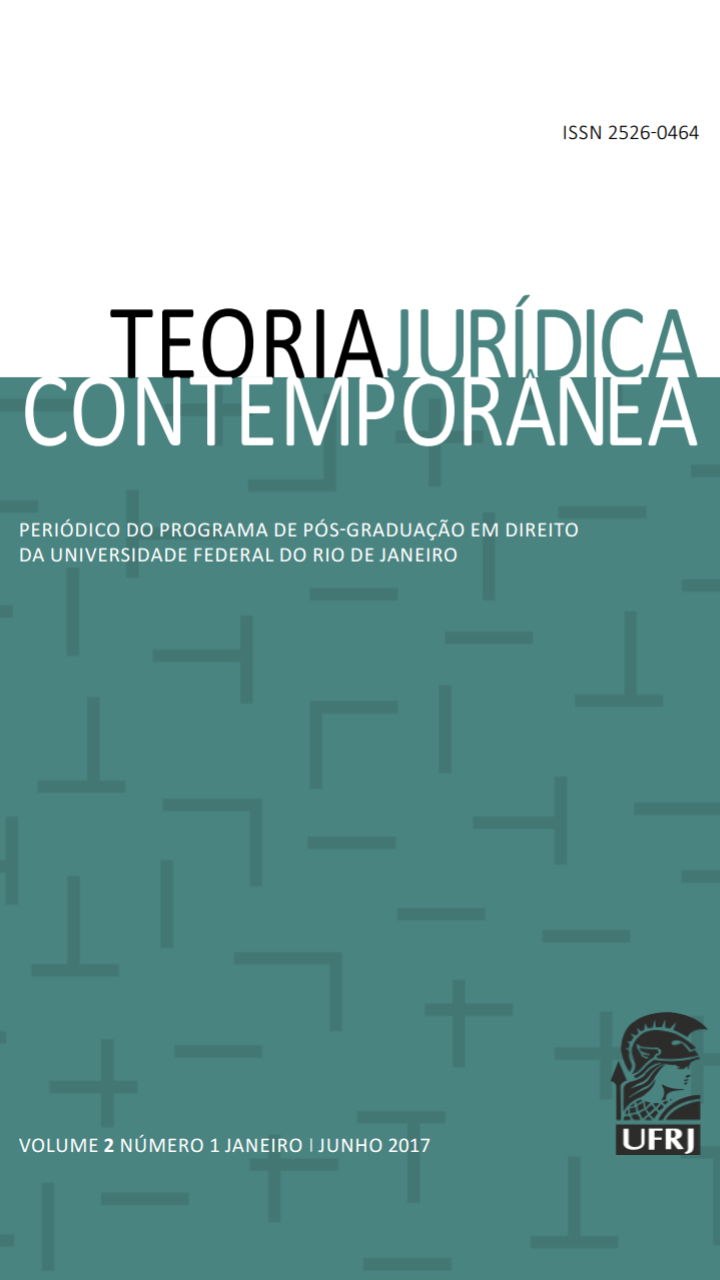Interpretation and Legal Theory: as críticas de Andrei Marmor ao interpretativismo de Ronald Dworkin
DOI:
https://doi.org/10.21875/tjc.v2i1.11883Keywords:
Teoria do direito, interpretação jurídica, Andrei Marmor, Ronald Dworkin, Legal Theory, Legal InterpretationAbstract
RESUMO:
O presente artigo tem por objeto as principais críticas que Andrei Marmor, em seu livro Interpretation and Legal Theory, apresenta à concepção de interpretação defendida por Ronald Dworkin. Em um primeiro momento, Marmor sugere que, para Dworkin, toda e qualquer conclusão sobre o Direito seria objeto de interpretação, o que não seria correto quando analisamos, por exemplo, o modo como seguimos certas regras e convenções. Em um segundo momento, Marmor argumenta que a perspectiva dworkiniana defende uma objetividade impossível de ser alcançada na interpretação: o fato de que compartilhamos valores de natureza incomensurável, por exemplo, implica na impossibilidade de se considerar que uma interpretação será, todas as coisas consideradas, melhor que outra. Analisando tais críticas à luz das respostas que Dworkin ofereceu ou poderia ter oferecido, conclui-se que a visão de Marmor sobre a concepção dworkiniana de interpretação é incorreta, na medida em que ignora distinções que lhe são centrais, como a diferença entre “conceitos criteriais” e “conceitos interpretativos”, e sobre a natureza integrada dos valores que compartilhamos socialmente. Ainda assim, o debate entre ambos os autores ressalta sua clara natureza metodológica, sendo importante para a compreensão do “estado da arte” da Teoria do Direito contemporânea de vertente analítica.
ABSTRACT:
This paper focuses on the main criticisms presented in Andrei Marmor's Interpretation and Legal Theory to Ronald Dworkin's conception of interpretation. In the first criticism, Marmor suggests that in Dworkin's theory each and every conclusion about what the law is in a given case is a result of interpretation, which cannot be correct when we think, for example, about the way we follow certain rules and conventions. In the second criticism, Marmor argues Dworkin supports an impossible objectivity view on interpretation: the fact that we share values of incommensurable nature, for example, implies that it is impossible to consider that one interpretation can be the best, all things considered. Considering both criticisms and the answers that Dworkin offered or could have offered to it, this paper concludes Marmor's view about Dworkin's concept of interpretation is incorrect, considering that Marmor ignores central distinctions of Dworkinian thought, such as the difference between "criterial” and “interpretive” concepts, and about the integrated nature of values we share on society. Nevertheless, the debate emphasizes its methodological nature, and is important to understand the state of art of the analytical contemporary legal theory.
References
DWORKIN, Ronald. Taking rights seriously. Estados Unidos: Harvard University Press, 1978.
DWORKIN, Ronald. Law's empire. Estados Unidos: The Belknap Press of Harvard University Press, 1986.
DWORKIN, Ronald. A matter of principle. Cambridge: Harvard University Press, 1985.
DWORKIN, Ronald. Justice in robes. Estados Unidos: The Belknap Press of Harvard University, 2006.
DWORKIN, Ronald. Justice for hedgehogs. Estados Unidos: The Belknap Press of Harvard University Press, 2011.
FINNIS, John. Natural law and natural rights. 2ª ed. New York: Oxford University Press, 2011a.
FINNIS, John. Reason and authority in Law's Empire, em FINNIS, John. Philosophy of law: collected essays, volume IV. New York: Oxford University Press, pp. 280-298, 2011b.
GUEST, Stephen. Ronald Dworkin. 3ª ed. Stanford: Stanford University Press, 2013.
HART, Herbert. The concept of law. 2ª ed. New York: Oxford University Press, 1994.
MACEDO JR, Ronaldo Porto. Do xadrez à cortesia: Dworkin e a teoria do direito contemporânea. São Paulo: Saraiva, 2013a.
MACEDO JR, Ronaldo Porto. Ensaios de teoria do direito. São Paulo: Saraiva, 2013b.
MARMOR, Andrei. Legal conventionalism, em COLEMAN, Jules (ed.). Hart's postscript: essays on the postscript to the Concept of Law. New York: Oxford University Press, 2001.
MARMOR, Andrei. Interpretation and legal theory. 2ª ed. Portland: Hart Publishing, 2005.
MARMOR, Andrei. Social conventions: from language to law. Princeton: Princeton University Press, 2009.
Downloads
Published
Issue
Section
License
The authors who publish in this journal agree with the following terms:
1. The authors maintain the copyright and grant the journal the right of first publication, with the work simultaneously licensed under the Creative Commons Attribution License that allows the sharing of the work with recognition of authorship and initial publication in this journal.
2. Authors are allowed to assume additional contracts separately, for non-exclusive distribution of the version of the work published in this journal (e.g., publishing in an institutional repository or as a book chapter), with acknowledgment of authorship and initial publication in this journal.
3. Authors are allowed and encouraged to publish and distribute their work online (e.g., in institutional repositories or as a personal page) at any point before or during the editorial process, as this may generate productive changes, as well as increase the impact and citation of the published work (See The Effect of Open Access).

This work is licensed under a Creative Commons Attribution-ShareAlike 3.0 Brazil License.

